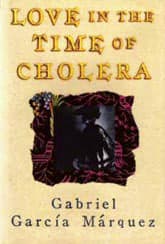Love in the Time of Cholera
CRITIQUE | QUOTES
 First English-language edition, 1988
First English-language edition, 1988First publication
1985
Literary form
Novel
Genres
Literary
Writing language
Spanish
Author's country
Colombia
Length
Approx. 145,000 words
Love, the beautiful disease
Love in the Time of Cholera is a favourite novel for lovers who take from it something like "Love is forever" or "Love conquers all" or "Follow your heart and you'll eventually find your one great love."
Yet, Gabriel García Márquez's story also appeals to cynics who see the yearning, love-obsessed protagonist, Florentino Ariza, as a pitiable object of ridicule and find the great love of the novel a charade.
García Márquez has set traps for both kinds of readers.
In Love in the Time of Cholera he eschews the magic realism of books like One Hundred Years of Solitude, for which he is known. But he is still a master of illusion.
Florentino and his love object, Fermina Daza, don't really know each other when they supposedly fall in love through a years-long secret exchange of letters. The veil falls from her eyes suddenly when confronted with him face to face.
She appears to genuinely share her heart with the man she ends up wedding instead, the good doctor Juvenal Urbino, and from outward appearances they have a solid rleationship. But inside the marriage it becomes clear that difficulties arise. Is this serious or is this the kind of settling into normal that every marriage goes through? We're never really sure.
Meawhile Florentino moves on romantically—amd sexually—with many partners, including one or two who seem to satisfying his yearnngs. But we're periodically shown he hasn't moved on at all.
Nor does he remain the innocent, acting with a selfishness and duplicity in his personal and business relations that undermine our sympathetic view of him as the awkward naïf.
The way life goes
And what do we make of the novel's resolution in his old age? Fulfilment of love supreme or grand delusion? What do we make of the woman's assessment of Florentino that "he loved her above all else, more than anything in the world, but only for his own sake"?
And what of the obvious comparison of human passion with cholera throughout? The dreaded disease—cholera, I mean—is seemingly ever-present, except when suppressed by Fermina's medical husband.
Maybe what we make of it all is that romantic ideals and the harsh realities undercutting them and the settling for something in-between are all parts of life. That no one can take one side exclusively, or even the middle ground, without losing something.
Or maybe the point is we have to go through all that to reach a level of experience and maturity where we can realistically make our dreams come true. But only if we preserve some part of our childish beings inside us.
Or maybe not. Maybe it's all just the way life goes, the good and bad mixed. García Márquez, even when he is not being a fabulist, has a way of writing that suggests a fable, a story larger than life but to which we bring our own morals.
His simple but colourful prose creates a lush picture of a world where all human feelings can flourish, where all possibilities have their chances to become real.
For my taste, there are too many long passages of exposition with the author explaining what the characters are going through. But as easy as the story is to follow, and as seductive as it is, it never gives away what is really going on.
Take that however you want.
— Eric
CRITIQUE | QUOTES

